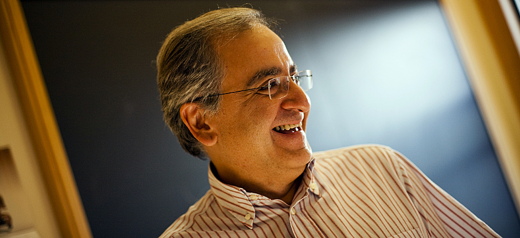Cumrun Vafa, an Iranian physicist who teaches at Harvard University, paid a visit to Iran in late June and delivered a speech on the so-called string theory and quantum physics at the University of Tehran and later at the Iranian Physics Association. In the final hours of his stay in Tehran, he was the guest of Night Sky, a TV program on IRIB Channel Four, and answered the questions posed by the program host: Siavash Safarian. The following is an excerpt of the interview as covered by a 108th issue of Danestaniha Weekly out on July 12:
Q. You and your colleagues have been trying to unravel one of the most important mysteries of the world. Tell us about the project you’re working on.
I am working on the so-called string theory which seeks to unravel the basic mysteries of physics. There are two main issues this theory seeks to incorporate: Einstein’s theory of relativity and quantum mechanics.
Q. What is this theory all about?
If you look at tiny particles such as electrons and protons from a different angle, you can replace those particles with strings. This theory is the only one which goes beyond the bounds of gravity and quantum physics and places them in a logical framework.
Q. What is it aimed at?
It is about physics, about the origin and end of the world, about the so-called black holes, and about primary particles. It covers masses from very small to very large and constitutes a core theory for physics.
Q. Would you tell us about your decision to go abroad?
After graduating from high school I moved to the US to further my studies. Seven or eight years later, the string theory which seeks to translate geometrical quantities to physical quantities and vice versa caught my eye.
Q. Does your work leave an impact on your mentality?
Scientific equations are always on my mind, because I find it difficult to push them out. Definitely, this leaves an impact on my mentality which differs from those who have little knowledge about scientific principles.
Q. Does that make your life any easier?
It makes my life stranger. Things that might sound interesting to others are not interesting to me. That is interesting because it brings you closer to the ultimate reality. Of course, as a physicist, I know that all theories could have holes. That is interesting too, because it helps you feel different.
Q. Everyone wants to contribute to efforts to make the world a better place. How do you think we can makethat happen?
I wish I could say I am making efforts toward that end. But the driving force behind my research is the pleasure I find in conducting research.
